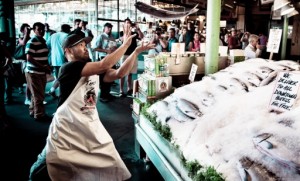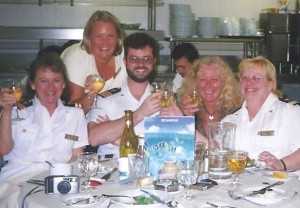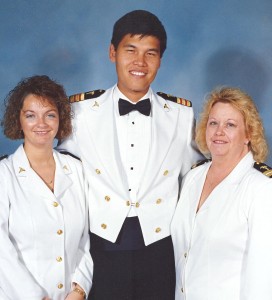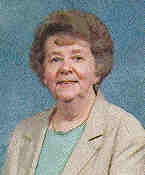What a mess! Christopher and Kate have been sent to their wealthy uncle in England. Their father gambled on the railroad and lost. Now the two have to find someone wealthy to marry in order to pay off the family debts and to support them.
Of course this brother and sister can’t manage to find and fall in love with someone with money. Christopher falls in love with the governess while Kate falls in love with the gardener.
Now the question is who will marry for love and who will sacrifice for money and family. Be sure you have that box of tissues handy. You’ll need a few before you finish this book.
Thank you, Kaye Dacus. I enjoy your books and am looking forward to the next one in The Great Exhibition series.
SS Baltic
Off the Coast of England
February 9, 1851
You should come back down to the saloon, where it’s warm.”
Kate did not turn from the vista of gray, choppy water in front of her at her brother’s voice. The last fourteen days seemed as nothing to Christopher—a lark, an adventure, not the exile Kate knew it to be.
An exile that came with an edict: Find someone wealthy to marry.
“I do not see the point in sitting in the grand saloon, pretending as though everything is fine when I know it is not. I have no talent at pretense.” Kate wrapped her thick woolen shawl closer about her head and shoulders at a gust of icy wind. “If any of those other passengers knew we were being sent to England as poor relations, they would shun us.”
Just as everyone in Philadelphia had. Word of Graham Dearing’s financial misfortune spread like last summer’s great fire that consumed the Vine Street Wharf—quickly and with almost as much destructive force. Kate and Christopher’s stepmother had been too embarrassed to come down to the train station to see them off to New York two weeks ago—too afraid she would see someone she recognized on the street and not be acknowledged. Only Father had come with them to New York to say good-bye. And to remind Kate why she was being sent to her mother’s brother: to find and marry a fortune that would save their family. The memory of their argument on the platform before she joined Christopher to board the ship burned through her like the coal that powered them closer to her destiny.
“What’s wrong with enjoying the trappings of money while we can?” Christopher sidled up beside her and leaned his forearms against the top railing. “Besides, from Uncle Anthony’s letter, it doesn’t sound like he plans to treat us any differently than his own children, just because we’re ‘poor relations,’ as you put it.”
“But they’ll know. Sir Anthony and his daughters and whatever house staff they have—they’ll know that we’re completely dependent upon their charity. It will be written in their eyes every time they look at us. Every time we sit down at a meal with them. Every time they take us to a ball or party. We will be creating additional expense for them.” Kate trembled, not just from the cold.
“You had no problem with our creating additional expense for Father when we lived at home. Why start worrying about it now?”
Kate finally turned to look—to gape—at her brother. Certainly he was younger than she, but only by three years. However, he was a qualified lawyer, a man full-grown at twenty-four years old. How could he speak so juvenile? Did he not realize what Father and Maud had done to afford to send them abroad? Had he not noticed the missing paintings, carpets, and silver—sold so Father could afford their passage? Kate had a suspicion that much of their stepmother’s heirloom jewelry had met the same fate. Not to mention Father’s sacrifice of pride in begging his first wife’s brother, the baronet Sir Anthony Buchanan, to take them in.
Christopher’s light-brown eyes twinkled and danced. “Come on, Kate. I’ve heard that wealthy men can be plucked up on every corner in England, so you’ve nothing to worry about. They will take one look at you and be lining up at Uncle Anthony’s door to court you.”
Heat flared in her cheeks. “You can stop that nonsensical flattery right now, Christopher Dearing. It will get you nowhere.” But she couldn’t stop the smile that forced its way through her worry.
“It got me exactly what I wanted.” He put his arm around her shoulders and gave her a squeeze, then turned and forced her to walk back toward the stairs leading down to the grand saloon on the deck below. “We will be docking in a few hours, and you’ve been sulking the entire voyage. I insist you come below and enjoy yourself, just for a little while. Or pretend, on my account.”
Tiny snowflakes floated down and landed on Kate’s shawl and the mittened hand holding it to her chin. “Oh, all right. I will come. But only to get warm before we dock.”
It took her eyes several moments to adjust to the darkness of the stairwell. Reaching the grand saloon, Kate slowed and waited for Christopher to regain her side. Though not yet noon, the candles in the hanging lamps and wall sconces had been lit against the gloomy gray skies outside. The large, etched-glass columns in the middle of the room, which connected to the skylights above, brought in little light to reflect from the mirrors lining the walls between the doors to the sleeping cabins.
Several younger men, playing cards in the corner near the foot of the stairs, called out to Christopher, entreating him to come join the game.
He waved them off with a laugh and then offered Kate his arm. “Come, there are a few people who would like to speak to you.”
At the opposite end of the long room, partially hidden by one of the glass pillars from the card players near the stairs, sat a group of middle-aged women and a few men. The rest of the men, she assumed, were in the smoking room.
“Ah, here is your beloved sister, Mr. Dearing.” An older lady patted the seat of the settee beside her. “Do, come sit, Miss Dearing.” Mrs. Headington’s clipped British accent made Kate more nervous than she usually felt before strangers. That, and learning the woman had been governess to their cousins many years ago. Mrs. Headington was so particular and exacting, Kate worried she and Christopher would disappoint their extended family at every turn.
Kate removed her mittens and shawl and perched on the edge of the sofa. “Thank you, Mrs. Headington.”
“We were just speaking of the Great Exhibition.” The plump former governess waved a fan in front of her flushed, moist face, her more-than-ample bosom heaving against her straining bodice with each breath.
“The Great Exhibition?” Kate folded the shawl and set it on her lap, where she rested her still-cold hands on it.
“Oh, Kate, I’ve told you all about it. Prince Albert’s Great Exhibition. It’s to be the largest display of industry and arts from all over the world.” Christopher’s eyes took on the same gleam as when he talked about laws governing the railroads. “Imagine—delegations are coming from as far as India, Algiers, and Australia and bringing displays of their industry and manufacturing, their artwork. Some are even bringing wild animals.”
He lost the dreamy expression for a moment. “And I have heard there will be agricultural exhibits, Kate. You may find some exotic plants for the garden.”
She smiled at the memory of her garden, her favorite place in the world—but melancholy and reality struck down the moment of joy. She might never see her garden again. For either she would marry some wealthy Englishman and stay in England for the rest of her life, or Father would be forced to sell the house.
Talk continued around her, rumors of fantastical exhibits and inventions supposedly coming to this great world’s fair, which would open in just under three months.
What would she be doing by then? What about Father and Maud and the girls? She shook her head, trying to stave off the unwanted visions of her father, stepmother, and little sisters begging on the streets of Philadelphia.
The steward entered the saloon and called everyone to follow him in to luncheon. Christopher offered Kate his hand. When she gained her feet, he bent over, placing his mouth close to her ear, as if to place a kiss on her cheek.
“I know what you’re thinking about. Don’t let it get you down. Everything will be all right. You’ll see.” He tucked her hand into the crook of his elbow and led her through the steward’s pantry, where the beautiful silver trays and chargers displayed there winked in the candlelight, mocking her with their opulence.
Mrs. Headington invited them to sit at her table for the meal, and Kate sank gratefully into the chair Christopher held for her. Though her brother knew almost all of the hundred or so first-class passengers traveling with them, Kate had kept to herself most of the voyage, unable to laugh and flirt and pretend the way Christopher could.
“You appear sad, Miss Dearing.” Mrs. Headington gave Kate a knowing look. “Is it a young man you have left back home who occupies your thoughts?”
Kate latched on to the question. “I had—have a suitor, ma’am. He courted me for over a year. I believed he would propose before . . . before Christopher and I left for England. But alas, he did not.”
Christopher’s jaw slackened, and Kate felt a kindling of amusement at his astonishment over her ability to spin the story in such a manner. Perhaps she did share some of his abilities, buried deep within.
“I do not know what the fellow could have been thinking, allowing a woman like you to slip away with no firm commitment. Does he realize how easily he could lose you to one of our fine English gentlemen?”
If only Mrs. Headington knew what Devlin Montgomery knew.
“If the blighter is not man enough to propose before you left, you should consider yourself free to accept other suitors, Miss Dearing. Though you must allow me to caution you against those wicked men who want nothing more than to ruin virtuous young women like you.” Mrs. Headington raised her teacup in emphatic punctuation to her warning, though speculation filled her gaze. “There are plenty of lords who will look beyond the lack of a title when it comes to a pretty face, so long as she has a substantial dowry.”
Kate hoped one of them would also look beyond the lack of a dowry. Rather than let Mrs. Headington’s unintentional disparagement send her back into the doldrums she’d been in since that awful discovery on New Year’s Eve, Kate continued smiling and trying to engage in conversation with Mrs. Headington and the other travelers who joined them at the marble-topped table.
It would do her no good to show up on England’s shores dour-faced and hung all around with melancholy. She had little enough to work with as it was—being too tall, with average looks, and angular features. Oddly enough, for Kate, the Old World meant a new life. Here, where no one knew her, where no one could recount the names of the men who had courted her and then decided not to marry her, she could forget the past, forget her failure to find a husband. In England, she could become Katharine Dearing, the woman who could not only carry on a conversation about botany or politics with any man, but who could dance and flirt as well.
For ten years, since her debut at seventeen, she’d turned her nose up at the young women who simpered and giggled and flattered all the young men. Well, most of those young women were now married with families of their own.
She glanced around the table and studied the interactions between married couples and among the few unmarried young women and men. Could she remake herself in the image of the debutante across from her with the blonde ringlets, whose coy, soft eyes and sweet smiles drew the men’s attention like bees to nectar?
To her right, Mrs. Headington argued with Christopher about the politics surrounding the Great Exhibition and the worry of many that Prince Albert would bankrupt the country with the lavish display of agriculture and industry.
Kate Dearing would have joined in the conversation of politics. Katharine Dearing, however, turned to the balding, middle-aged man on her left. “What part of England are you from, Mr. Fitch?”
She lowered her chin and blinked a few times, trying to imitate the blonde’s batting eyelashes. The man beside her almost choked on his wine before setting down the goblet to answer, obviously no more accustomed to being flirted with than Kate was to flirting.
Dowry or no dowry, she must and would find a wealthy husband. And as her stepmother was so fond of saying, practice makes perfect.
~
Andrew Lawton drew his coat collar higher around the lower part of his face and pulled his hat down, wishing it would cover his ears, exposed as they were to the frigid winter air. Beyond the inn’s small front porch, snow blew and swirled on the indecisive wind—first toward, then away; left, then right. White dust skittered this way and that on the cobblestone street.
He closed his eyes and took a deep breath, longing for spring and the orderliness and discipline he would bring to the gardens at Wakesdown Manor. He had the plans all laid out on paper and was prepared to begin construction of the new gardens so they would be ready to burst into bloom when warm weather arrived. But instead, he was in Liverpool. And on a Sunday, no less.
Who would choose to travel by steamship in the middle of winter?
He’d only just managed to get away from Mr. Paxton and the Crystal Palace in time to catch the train from London to Liverpool yesterday. Eleven hours on an unforgiving wooden seat in the unheated third-class car—not wanting to part with his hard-earned wages in order to ride in the warmth and comfort of second class or the luxury of first—followed by a night on a lumpy bed in a freezing inn had done his back and his temper no favors.
Rather than go to the expense of a hiring a cab for the mile walk back to the train station, Andrew adjusted his collar again, hooked the handle of his valise over his left wrist, stuffed his gloved hands into his coat pockets, and leaned into the swirling wind with a brisk pace. The inn’s distance from the station had made it economically attractive for the overnight stay—half the cost of those within a block or two of both the train station and the Mersey River ports, where everything and everyone came in and out of Liverpool.
By the time he reached his destination, the swirling white dust had turned to hard, pelting ice. According to the timetable written on the board in the ticket office, the Baltic had docked ten minutes ago, shortly after one o’clock.
If he caught the two o’clock train, he would arrive in Oxford near eleven tonight. He desperately wanted to sleep in his own bed after so many nights away. He purchased three first-class tickets, as per his employer’s instructions, tucked them into his waistcoat pocket, then went to the telegraph office and wired Sir Anthony so he would know to be expecting his guests to arrive tonight.
Back out on the platform, he noticed the ferry from the steamship had landed at the far end. Passengers disembarked while crew unloaded baggage through a lower-deck portal.
He scanned the passengers coming toward him, looking for a young man and young woman traveling together. Americans. That was all Andrew knew. Dismissing several older people and a couple of women traveling alone, Andrew released his breath in frustration.
“You look lost, young man.” A woman in a dress too tight and juvenile for her ample form and age stopped in front of him.
Andrew doffed his round-crowned bowler hat—and the woman frowned at it a moment. If Andrew had known he would be making this side trip when he left Wakesdown, he would have packed his top hat, since the more serviceable bowler served to emphasize his working-class roots.
“Good afternoon, ma’am.” Andrew tucked the hat under his elbow. “I am supposed to be meeting a Mr. and Miss Dearing. You do not, perhaps—”
“Christopher and Kate. Of course I met them. It is hard not to get to know all the other passengers on a two-week voyage.”
Andrew inclined his head in relief. “Would you mind pointing them out to me?”
“No, not at all.” She squinted at the ferry. “Yes, there they are. Good-looking fellow in the indigo coat. The young woman is, alas, much plainer than her brother.” The woman leaned closer and dropped her voice. “And if what I heard in Philadelphia is true, their father, wicked man, just lost all his considerable fortune in a railway speculation that failed. Poor dear. Only way she would have caught a husband at her age and with her lack of beauty would have been with a substantial dowry.”
Andrew scanned the passengers coming off the boat. There—a young man in a dark blue overcoat. But that could not be Christopher Dearing. For the woman beside the man in the blue coat was anything but plain. Not beautiful like Sir Anthony’s daughters—but far from plain. A straw-brimmed bonnet hid her hair, but her brown cloak and shawl emphasized her bright blue eyes, even from this distance.
“Now, if you will excuse me, I must arrange my travel to London.”
Andrew gave the older woman a slight bow, then stepped forward to meet the Dearings.
Andrew stepped into the man’s path. “Are you Mr. Dearing?”
A smile replaced the look of consternation. He stuck out his gloved hand, which Andrew shook in greeting.
“Christopher Dearing.” He pulled the arm of the young woman in the brown cloak, who’d stopped a full pace behind him. “And this is my sister, Kate—I mean, Katharine.”
Katharine gave a slight curtsy, red tingeing her cheeks.
“Andrew Lawton.” He inclined his head, then dragged his gaze from the woman—whose face was, perhaps, a bit too square for her to be considered truly handsome—back to her brother. “Sir Anthony sends his apologies for not coming to meet you personally. But his youngest daughter fell ill two days ago, and he did not want to leave her.” He glanced back at Katharine Dearing, to keep her from feeling excluded from the apology.
Concern flooded her striking blue eyes. “I hope it isn’t a grave illness.”
Andrew reminded himself that Miss Dearing was Sir Anthony’s niece and, therefore, no one who should garner his interest in any capacity other than as one of the masters—fortune or no. “When last Sir Anthony wired, he did not believe it to be more than a fever due to the wet winter we are having and Miss Florence’s insistence on riding every day no matter what the weather.”
“I am sorry she’s ill, but it is good to know it isn’t dire.” Katharine looked as if she wanted to say more, but at the last moment lost her nerve.
“So . . . did I hear you correctly?” Christopher asked. “The name is pronounced Antony and not Anthony?”
“Yes, Mr. Dearing, you heard correctly.”
Miss Dearing transferred a tapestry bag from one hand to the other.
“May I take that for you, miss?” Andrew pushed his hat back down on his head and reached for her bag.
“Oh, you don’t—” But she let the protest die and handed him the bag with a sudden doe-eyed smile. “Why, thank you, Mr. Lawton. We arranged with the steward to have our trunks transferred directly to the Oxford train. The schedule they had aboard ship indicated there is one that leaves at two o’clock.”
“Yes, that is our train.”
Katharine looked up at her brother. “We should get our tickets now so that we are ready when it’s time to board.”
“No need.” Andrew shifted her bag to his left hand, along with his own, and patted the waistcoat pocket through his frock and overcoat. “I have already taken care of the tickets. The train arrived just moments ago, so we can go find a compartment.” He motioned with his free hand for Christopher and Katharine to join him, and he led them down the platform.
“My, but you have already thought of everything, haven’t you?” Katharine’s flirtatious expression seemed odd, like a daisy growing from a rosebush.
And the look of confusion on her brother’s face only added to Andrew’s. Surely she realized from his humble attire he wasn’t anyone who could offer her the wealth she apparently needed in a husband. So why would she overtly flirt with him?
“How long a trip is it from here to Oxford?” Christopher asked.
“Almost nine hours, so long as the tracks are clear.” Andrew looked past the roof of the station. Snow mixed with the icy precipitation from half an hour before, and it looked to start piling up quickly. Hopefully, traveling south and inland from here would mean away from the snow.
He found a compartment in the first-class car, set his and Katharine’s valises on the seat, and turned to assist her in. She thanked him profusely. Once she was settled, he and Christopher lifted the small valises onto the shelf over the seat opposite Katharine, and then sat, facing her.
Katharine wrapped her shawl tighter around her shoulders and arms. Christopher leaned over and opened the grate of the small heater and stoked the glowing red coal. “I’d hoped maybe to see one of those new heaters I’ve been reading about—where steam heat is pumped from the fire in the locomotive throughout the cars in the train.”
“Have you an interest in the railway, Mr. Dearing?” Though he had no desire to make the sister feel left out of the conversation, Andrew was in great danger of allowing himself to stare at her now that she was in such close proximity. Upon second thought, the squareness of her jaw did not detract from but added to the symmetry of her face. And above all else, Andrew appreciated symmetry.
“Yes—my apprenticeship was with a firm that specializes in railway law. It’s fascinating to see how, in a matter of just ten or twenty years, the railroad has changed our way of life.” Christopher stretched his lanky frame into a position of repose, obviously accustomed to the comforts of first-class accommodations.
“I was twenty years old when the railroad came to Derby—my home—in the year ’40. It has quite changed the way of life for everyone there.” Andrew removed his hat and gloves and set them on the seat beside him.
Christopher’s eyes—brown, rather than blue like his sister’s—flashed with curiosity. “Really? I hardly remember when the first railroad opened in Philadelphia in 1832.”
“That’s because you were not quite six years old when it came.” Katharine’s soft voice reminded them of her presence—as if Andrew needed reminding. “I remember it well. Father took us to the parade and to see the locomotive take off. It was the first time we were all happy since Mother and Emma died.” Katharine’s focus drifted far away along with her voice.
Andrew stared at her. In the space of mere minutes, she had changed entirely. No longer did she seem a vapid flirt, but a woman one might like to converse with.
Katharine’s eyes came back into focus. “I do apologize. I didn’t mean to cast a melancholy pall over the conversation.” The strangely foreign flirtatious smile reappeared. “What is it that you do for Sir Anthony, Mr. Lawton? You must hold quite the position of importance for him to have sent you to meet us and escort us to Wakesdown.” Her long eyelashes fluttered as she blinked rapidly a few times.
“I am a landscape architect. I am redesigning all of the gardens and parks on Sir Anthony’s estate.”
At the mention of gardens, something miraculous happened. A warmth, a genuine curiosity, overtook Katharine Dearing’s blue eyes. Ah, there was the rose pushing the daisy out of its way.
“You’ve done it now.” Christopher sighed dramatically. “One mention of gardening, and Kate will talk your ears off about plants and flowers and weeds and soil and sun and shade.”
Katharine gave a gasp of indignation, but quickly covered it with the flirtatious smile again. “I am certain I do not know what you mean, Christopher. I would never think to importune Mr. Lawton in such a manner.” She crossed her arms and turned to gaze out the window.
The train lurched and chugged and slowly made its way from the station.
Andrew couldn’t tell if Katharine was truly angry at her brother or not, but he determined a change of subject might be in order. “Will you continue to read the law, Mr. Dearing?”
Christopher nodded. “I brought some books with me to study, yes. And I expect I’ll pick up many more on the British legal system while I’m here.”
Andrew opened his mouth to ask if Christopher were joking with him—but then pressed his lips together. Perhaps they had a different term in America for the pursuit of education in the legal system other than read. “Will you seek out a lawyer to apprentice with?”
“If Uncle Anthony doesn’t mind, I might do that just to keep myself busy.”
Katharine made a sharp sound in the back of her throat.
“Oh, right, I’m supposed to call him Sir Anthony until he gives us permission to call him uncle.” Christopher grinned at Andrew. “Though really, in this modern era, why anyone would stand on such formality is beyond me.”
Under the wide brim of her bonnet, Katharine rubbed her forehead with her fingertips, now freed from the mittens she’d worn earlier. Upon first seeing the Dearings, he’d assumed Christopher the older and Katharine the younger—from the way Katharine hovered behind her brother when they first met. Now, however, from Katharine’s memory of something that happened almost nineteen years ago, she was obviously the older sibling. And if Christopher had been six years old in 1832, that meant he was now around five-and-twenty. Meaning Katharine must be in her late twenties, if not already Andrew’s age of thirty.
That was what the woman he’d met at the station meant by “at her age.” Andrew was not certain how things were done in America, but here in England, Miss Dearing would be considered well past the prime marriageable age. And if the rumors that woman heard in Philadelphia were true, without a substantial dowry, Katharine had no chance of marrying well.
For the first time in his life, Andrew felt true pity for another person. The last thing he’d promised his mother before she died of lung rot was that he would not end up like her—condemned to live out her days in the poorhouse. He’d worked hard to get where he was today, and he would do whatever it took to continue bettering himself and his condition.
He thanked God he had not been born a woman.




















